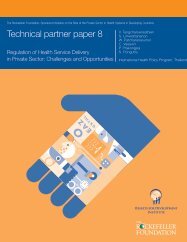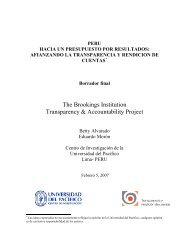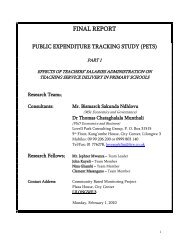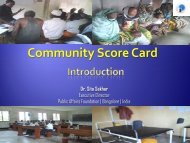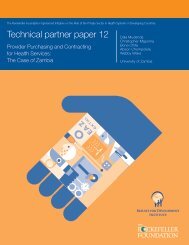Innovative Secondary Education For Skills Enhancement
Innovative Secondary Education For Skills Enhancement
Innovative Secondary Education For Skills Enhancement
Create successful ePaper yourself
Turn your PDF publications into a flip-book with our unique Google optimized e-Paper software.
Table 3: Skill needs in a sample of high-growth sectors in India<br />
Sector<br />
Automobiles<br />
Information technology<br />
Finance (especially that which is<br />
outsourced to India)<br />
Tourism<br />
Construction and real estate<br />
Skill gaps<br />
Three subsectors of the automobile industry experience very different skill issues:<br />
• Service: The biggest skill gaps are the inability to understand how a small task<br />
such as tightening a bolt fits into the bigger picture; inadequate knowledge of<br />
automobile machinery trade knowledge, or poor application of available knowledge;<br />
absenteeism; and the lack of skill standardization across employees trained in the<br />
same functions at different training institutes.<br />
• Manufacturing: No particular skill gaps. Mainly technical skills are required and<br />
available.<br />
• Mechanics: Even more technical skills are required than in manufacturing and these<br />
are seriously lacking, especially an understanding of the functions of and differences<br />
between automobile parts, a tendency to rely on judgment rather than on instructions<br />
and manuals, and so forth.<br />
Major skill gaps can be divided into two types:<br />
• Functional skills: Weak analytical ability, lack of attention to detail, lack of<br />
understanding of information security and privacy issues.<br />
• Soft skills: Weak communications, multitasking, perseverance, problem solving.<br />
Non-cognitive skills such as communication, perseverance, emotional intelligence,<br />
aptitude for repetitive work, knowledge of the industry and of such things as asset<br />
classes, basic finance.<br />
Inadequate knowledge of geography, communications, and safety measures. Many<br />
employers even cite a gap for basic skills such as reading, writing, and math.<br />
Inadequate knowledge of construction and of basic machine operations, and inability<br />
to understand instructions. Problems attributed to the excessively theoretical vocational<br />
training in Indian institutions with insufficient practical work.<br />
Textiles<br />
<strong>For</strong> machine operators, technical skills gaps, especially lack of understanding of<br />
machines plus non-cognitive inability to multitask. <strong>For</strong> supervisors, both the same<br />
technical skills gaps and also management skills.<br />
In addition to these results from the focus groups, the<br />
South Asian work in India also included some analysis of<br />
the skill requirements of 11 high-growth sectors as identified<br />
by the Planning Commission. That analysis underscores<br />
the critical importance of cognitive, non-cognitive<br />
and technical skills. Every sector has some basic skills<br />
requirements including basic literacy, some specific skills<br />
sets which are industry-specific and non-cognitive skills<br />
that are common across sectors.<br />
Southeast Asia 7<br />
Three countries were studied in depth: Cambodia and<br />
Thailand through a secondary analysis of large-scale<br />
surveys conducted in 2008 and Vietnam using primary<br />
data from a newly conducted survey covering 21 employers.<br />
8 In all three, employers generally consider that the<br />
skills acquired in formal secondary schooling do not meet<br />
their demand as the schooling is too supply driven and<br />
insufficiently linked to demand from employers. Neither<br />
general nor vocational secondary education is equipping<br />
school levers with the key skills needed: basic subject<br />
knowledge, analytical skills, management skills, technical<br />
skills, teamwork, foreign languages, computer and ICT<br />
skills, problem-solving skills, and interpersonal skills.<br />
In Thailand, six skills are considered crucial: analytical<br />
skills, management, technical skills, teamwork, computer<br />
skills, and foreign language skills. Of those, the first four<br />
are considered more important than the last two. At all<br />
levels, from unskilled workers to experts, employers<br />
generally demand higher levels of skill than workers and<br />
school leavers can offer (Figure 6).<br />
7 This section draws on Chalamwong, Hongprayoon, et al (2012).<br />
8 We obtained 2008 employer survey data from the Cambodian Federation of Employers and Business Associations and the Thailand Labor Demand of Establishment<br />
Survey. The former surveyed 220 enterprises while the latter covered 190,024 enterprises.<br />
16 <strong>Innovative</strong> <strong>Secondary</strong> <strong>Education</strong> <strong>For</strong> <strong>Skills</strong> <strong>Enhancement</strong> (ISESE)





